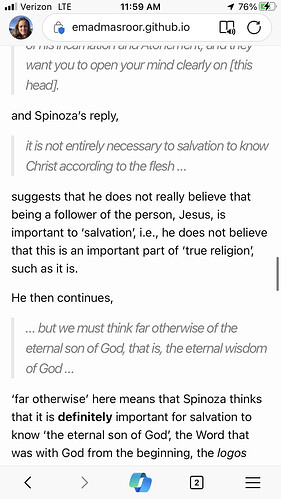Can someone kindly remind me why it’s necessary that there are infinite attributes?
The whole of his framework works without it being infinite attributes.
We could edit it to say all possible attributes and not a lick of his framework loses its power.
What niggles my tithers is that this one detail seems like an unnecessary blemish in a sea of necessity.
For example, all that is, let’s call that God-as-nature. Fine so far.
We don’t get how that can have a first cause so as far as we can conceive this GaN is causa sui. Fine. That implies GaN is eternal. Fine.
But here’s where you lose me: it has infinite attributes and this is because if it didn’t, it wouldn’t be self sufficient and perfect.
Huh? Back up
It seems like the necessary point would be that it contains all possible attributes. That is sufficient. Not infinite attributes. That’s possible but not necessary. If it is necessary I don’t see how he arrives at that.
I see zero reason why this has to be infinite attributes for the whole wonderful subsequent system to work.
Also I don’t see how he geometrically arrives at this metaphysical commitment of infinite attributes.
Spinoza is still the best framework I know of; I feel like it subsumes all other frameworks and perspectives, and is thus the king daddy of philosophy.
I think this way, even if substance doesn’t contain infinite attributes. That part feels like a non sequitor and can be totally jettisoned without hurting the important parts of the philosophy like the implications of hard incompatibilism and Conatus, and the expansiveness of self as we recognize more and more the truths of the Spinozan framework.
But I feel like this one thing is an annoying flaw. Not fatal, but odd. What am I missing?
Please don’t answer with quotes from Ethics or links elsewhere. I’ve read it all.
